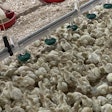
Memphis Meats thinks it can make meat better than the meat industry, according to a company leader.
On June 25, 2018, Dr. Eric Schulze, Memphis Meat’s vice president of product and regulation, said the Berkeley, California, cultured meat startup company can produce meat more efficiently and sustainably than conventional means. Schulze spoke at the 2018 American Meat Science Association Reciprocal Meat Conference in Kansas City, Missouri.
“We can think of livestock as technology that turns feed into meat,” Schulze told an audience of meat scientists. “Up until now, this process has been the most efficient way to produce meat. We think we’ve improved upon it.”
About Memphis Meats
Founded in 2015, Memphis Meats is a member of a growing pack of companies looking to grow animal tissue – what they call clean meat – by culturing cells harvested from animals. In June 2018, WATT PoultryUSA published a pair of articles on the nascent technology and the companies developing it.
Although it doesn't have a product on the market, Memphis Meats is winning support from key venture capitalists and major meat industry players. It counts Tyson Foods Inc. and Cargill Inc. among its backers. Schulze said the company does not consider itself to be in competition with the traditional meat industry but rather a potential partner looking to feed a hungry world.
Improving upon meat
Schulze described a company with lofty ambitions. It sees itself as another step in the constant evolution and improvement of agricultural processes. The goal is to produce meat without what he identified as the drawbacks of arable land and fresh water use and greenhouse gas emissions, and to do so more efficiently.
“We can take 23 calories to put it into a cow and get one calorie out. That is incredible. I don’t want to diminish that,” Schulze said. “But we think we can do better, on the order of three-to-one, making the same amount of beef.”
The company – which supplied a number of product tastings but doesn't have any product release date – believes it will be able to produce a better version of meat using less resources. He claimed cultured meat will require as much as 90 percent less land and 45 percent less energy while emitting as much as 90 percent less greenhouse gas than conventional livestock rearing. Additionally, he said less resource use will lead to higher meat yield.
Moreover, he said the product will be safer because it does not carry any foodborne bacteria found in conventional meat. This sterility would be helpful in both improving food safety and reducing food waste. He said it would greatly increase the product’s shelf life, reduce the risk of foodborne illness and alter the needs for product transportation.
“We believe we’re leading this food revolution and there’s a lot more ahead than there is behind us at this point and I think that’s the most exciting aspect of being in this world,” Schulze said. “Regardless of how you feel about these products and production practices there is an exciting future ahead for everyone here and we want to be a part of it and we’re looking forward to anyone here as well who wants to be a part of it.”
Regulating cultured meat as meat
Schulze – who previously worked for the Food and Drug Administration – said Memphis Meats maintains the position that its product is meat and therefore it should be regulated as such. In recent months, state legislatures considered prohibiting the sale of cultured meats as meat products. The National Cattleman’s Beef Association is calling for the FDA to take enforcement action against what it considers to be mislabeled products, plant-based proteins sold as meat, and for the U.S. Department of Agriculture to take over jurisdiction of all cultured meat products.
Schulze said his company believes the existing laws provide adequate authority and framework for regulating the products. His company believes the FDA and USDA should work together to resolve regulatory challenges surrounding cultured meat products. He argued that Memphis Meats products would fall under the legal definition of meat because: the tissue is obtained from an amenable species or domesticated bird; the tissue is derived from part of an amenable species that is normally consumed as meat and the tissue is rendered non-living prior to consumption.
He argued that the U.S. and the USDA have long promoted innovation and novel food products that do not fundamentally change the product. Even if Memphis Meats products are developed in a novel way, he reasoned, they are still meat and therefore should not require special labeling or special exceptions to the law.
“Our products are meat produced with meat,” Schulze said. “The difference is this very familiar product is produced in an extraordinary way which we hope becomes traditional.”



















